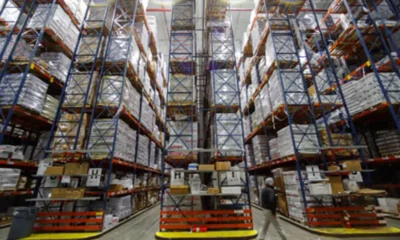News
Nearly 80% of occupiers prioritize physical offices, want employees back in office, says CBRE’s India Future of Office Survey 2021


National – December 22, 2021 –Real estate consulting firm, CBRE South Asia on Wednesday announced the findings of its ‘India Future of Office Survey 2021’- conducted between September and November this year. CBRE reached out to close to 100 occupiers, with a combined employee base of over 100,000 in India. This included both global and domestic corporates from key sectors including technology, BFSI, engineering & manufacturing, infrastructure, real estate & logistics, research, consulting & analytics, and pharmaceuticals/healthcare.
The survey observed that with the importance of physical offices intact, the need for workplace flexibility and safety would drive new behaviors across occupiers, developers, and investors. Senior business leaders have expressed a strong desire to bring employees back to the office with about 80% of them prioritizing physical offices; but several of them are also willing to offer a greater degree of flexibility and choice. The survey highlighted that about 58% of respondents in India plan to implement policies allowing office-based working with the option of working from home.
Survey Highlights:
- About 88% of our survey respondents believe business conditions are currently improving in the country, marking substantial progress from the survey CBRE conducted post the first wave in 2020. Moreover, sentiments regarding this improvement are slightly stronger in India as compared to APAC where 71% of respondents highlighted the same.
- It is to be noted that none of the respondents chose ‘contracting’ as a way to describe their current business conditions in India.
- 62% indicated they would expand their portfolios over the next two years.
- The average office utilization rate in India was less than 25% in Jun-Aug 2021, with the pace of return to work varying across the country.
- About 58% of respondents in India plan to implement policies allowing office-based working with the option of working from home – as compared to only 47% in APAC.
- At least 1-4 days / month to be the preferred hybrid work format in India in the long run
- 42% of respondents in India would require hybrid working eligibility to be determined by managers and pre-approved by the company as compared to 30% in APAC.
- 93% plan to include flexible spaces in their portfolios two years from now.
- Renewals (49%), renegotiations (44%) and flexible terms (29%) are the top preferred short-term leasing strategies.
- Touchless technologies (82%), improved air quality (76%) and more collaborative spaces (57%) imperative in the future.
- Almost 60% of respondents would continue to provide 75-125 sq. ft. per capita even after two years.
Post the second wave, occupiers are striving to encourage employees to come back to offices with their safety and well-being at the forefront of their ‘return to work’ plans. The survey highlighted three areas that require tech enhancement to facilitate return to work – admin, FM services and amenities, along with space tracking.


Anshuman Magazine, Chairman & CEO – India, South-East Asia, Middle East & Africa, CBRE said, “In CBRE’s view, despite an increased adoption of hybrid working during the pandemic, a wider adoption in the long-run seems unlikely. Even with the adoption of hybrid work, most companies expect employees to work in the office most of the time. This new shift in working patterns should be considered amidst occupiers’ intent to expand portfolios in India over the next two years.
We thus believe the adoption of hybrid working practices would have only a limited downside impact on future office demand in the medium to long term, particularly as space planning is undertaken based on long-term peak occupancy rates.”


Ram Chandnani, Managing Director, Advisory & Transactions Services, CBRE India said, “The current pandemic is accelerating changes in performance, expectations and role of the workplace. Successful and targeted strategies can envision a practically implementable ‘Future of Work Concept’, effectively leveraging potential changes in work styles and corresponding opportunities to rebalance the workplace.
Majority of the respondents were clear on the importance of the physical office across our India, APAC, and larger global markets. While the relevance of physical space is here to stay, the focus of business must be on the evolving purpose of office spaces.”
Another key CRE area identified by the survey is the growing importance of Environmental, Social and Governance (ESG). Nearly 60% of respondents to CBRE’s 2021 Global Investor Intentions Survey Report stated they have already adopted ESG criteria as part of their investment strategies.
Key Future Office Trends
Hybrid working:
- Business leaders have a strong desire to bring employees back to the office but at the same time are willing to offer a greater degree of flexibility and choice.
- Several organizations are currently conducting pilot studies into the feasibility of hybrid working before they commit to large-scale implementation.
- Most companies would offer frequent or infrequent hybrid working options to mainly 25% of the workforce in India in the long run.
- CBRE cites that clear guidelines should govern hybrid work eligibility and approvals. Going forward, this governance would be more stringent in India as compared to other APAC regions.
Portfolio growth and agility:
- Physical office is still a requirement for most employees. Hence, most occupiers intend to expand portfolios over the next two years.
- New ‘core+flex’ strategies are emerging amidst portfolio expansion and hybrid working.
- Increased use of flexible spaces and consolidation are top short-term portfolio strategies.
- As the flexible space industry continues to evolve to meet occupier requirements, a broader offering, ranging from on-demand meeting space to customized private suites, is becoming available.
Workplace strategies:
- Workplace strategies are being fundamentally reset to allow for a more hybrid workforce by adding collaborative and tech-enhanced spaces.
- About half of the respondents would increase their staff-to-desk-sharing ratios in the next two years.
- Targeted mobility and activity-based working would be top seating preferences.
- The financial obligations, compliance, employee engagement and liability considerations of a hybrid work program must be weighed.
The future role of the office
- The advent of hybrid working would change the future role of the office as a center for employee collaboration.
- The future role of the office is evolving to ensure the safety, wellness, productivity and engagement of a more distributed workforce.
- The workplace would be more effective for employee engagement, collaboration and team productivity.
- Health & wellness and safety continue to be key priorities for occupiers in India as a majority of the respondents would be implementing more touchless technologies as well as HVAC solutions.
-



 News3 weeks ago
News3 weeks agoKW Delhi 6 Mall Onboards New Brands
-



 News3 weeks ago
News3 weeks agoManasum Senior Living Launches IKIGAI GOA, A Senior Living Community in North Goa, in collaboration with Prescon Homes
-



 News2 weeks ago
News2 weeks agoGodrej Properties Sells Rs 3k cr+ Homes of Godrej Zenith, Gurugram, within 3 days
-



 News3 weeks ago
News3 weeks agoBridging India Divide: Top 5 Tier- 2 Cities to Focus On
-



 News3 weeks ago
News3 weeks agoCommercial Realty Gets Tech Savvy: Fast Construction, Enhanced Convenience
-



 News3 weeks ago
News3 weeks agoMultipoint Connection – A Definite Boon
-





 News2 weeks ago
News2 weeks agoRBI’s Status Quo on Key Policy Rates to Help Maintain the Real Estate Growth Momentum, Say Industry Stalwarts
-



 News3 weeks ago
News3 weeks agoSacred Cities See a Retail Boom as Spiritual Tourism Surge: CBRE Report























